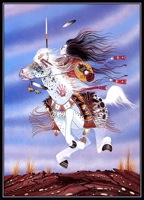Difference between revisions of "Nomad"
(Created page with 'File:lighterstill.jpgright|frame ==Etymology== Latin nomad-, nomas member of a wandering pastoral people, from Greek, from nemein *D...') |
m (Text replacement - "http://" to "https://") |
||
| Line 3: | Line 3: | ||
==Etymology== | ==Etymology== | ||
[[Latin]] nomad-, nomas member of a wandering pastoral people, from [[Greek]], from nemein | [[Latin]] nomad-, nomas member of a wandering pastoral people, from [[Greek]], from nemein | ||
| − | *Date: [ | + | *Date: [https://www.wikipedia.org/wiki/16th_Century 1579] |
==Defnitions== | ==Defnitions== | ||
*1 : a member of a people who have no fixed [[residence]] but move from place to place usually [[seasonal]]ly and within a well-defined territory | *1 : a member of a people who have no fixed [[residence]] but move from place to place usually [[seasonal]]ly and within a well-defined territory | ||
*2 : an [[individual]] who roams about | *2 : an [[individual]] who roams about | ||
==Description== | ==Description== | ||
| − | '''Nomadic''' people ([[Greek]]: νομάδες, nomádes, "those who let pasture herds") are [[communities]] of people who move from one place to another, rather than settling permanently in one location. There are an estimated 30-40 million nomads in the world. Many [[cultures]] have [[traditionally]] been nomadic, but traditional nomadic [[behavior]] is increasingly rare in industrialized countries. Nomadic cultures are [[discussed]] in three categories according to [[economic]] specialization: [ | + | '''Nomadic''' people ([[Greek]]: νομάδες, nomádes, "those who let pasture herds") are [[communities]] of people who move from one place to another, rather than settling permanently in one location. There are an estimated 30-40 million nomads in the world. Many [[cultures]] have [[traditionally]] been nomadic, but traditional nomadic [[behavior]] is increasingly rare in industrialized countries. Nomadic cultures are [[discussed]] in three categories according to [[economic]] specialization: [https://en.wikipedia.org/wiki/Hunter-gatherer hunter-gatherers], [https://en.wikipedia.org/wiki/Pastoralism pastoral nomads], and "peripatetic nomads". |
Nomadic [[hunting]] and gathering, following [[season]]ally available wild [[plants]] and game, is by far the oldest [[human]] subsistence [[method]]. | Nomadic [[hunting]] and gathering, following [[season]]ally available wild [[plants]] and game, is by far the oldest [[human]] subsistence [[method]]. | ||
| Line 14: | Line 14: | ||
Pastoralists raise herds, driving them or moving with them, in [[patterns]] that normally avoid depleting pastures beyond their [[ability]] to recover. | Pastoralists raise herds, driving them or moving with them, in [[patterns]] that normally avoid depleting pastures beyond their [[ability]] to recover. | ||
| − | Peripatetic nomads, who offer the [[skills]] of a craft or trade to those they [[travel]] among, are most common in industrialized nations.[ | + | Peripatetic nomads, who offer the [[skills]] of a craft or trade to those they [[travel]] among, are most common in industrialized nations.[https://en.wikipedia.org/wiki/Nomad] |
[[Category: Sociology]] | [[Category: Sociology]] | ||
Latest revision as of 01:24, 13 December 2020
Etymology
Latin nomad-, nomas member of a wandering pastoral people, from Greek, from nemein
- Date: 1579
Defnitions
- 1 : a member of a people who have no fixed residence but move from place to place usually seasonally and within a well-defined territory
- 2 : an individual who roams about
Description
Nomadic people (Greek: νομάδες, nomádes, "those who let pasture herds") are communities of people who move from one place to another, rather than settling permanently in one location. There are an estimated 30-40 million nomads in the world. Many cultures have traditionally been nomadic, but traditional nomadic behavior is increasingly rare in industrialized countries. Nomadic cultures are discussed in three categories according to economic specialization: hunter-gatherers, pastoral nomads, and "peripatetic nomads".
Nomadic hunting and gathering, following seasonally available wild plants and game, is by far the oldest human subsistence method.
Pastoralists raise herds, driving them or moving with them, in patterns that normally avoid depleting pastures beyond their ability to recover.
Peripatetic nomads, who offer the skills of a craft or trade to those they travel among, are most common in industrialized nations.[1]
